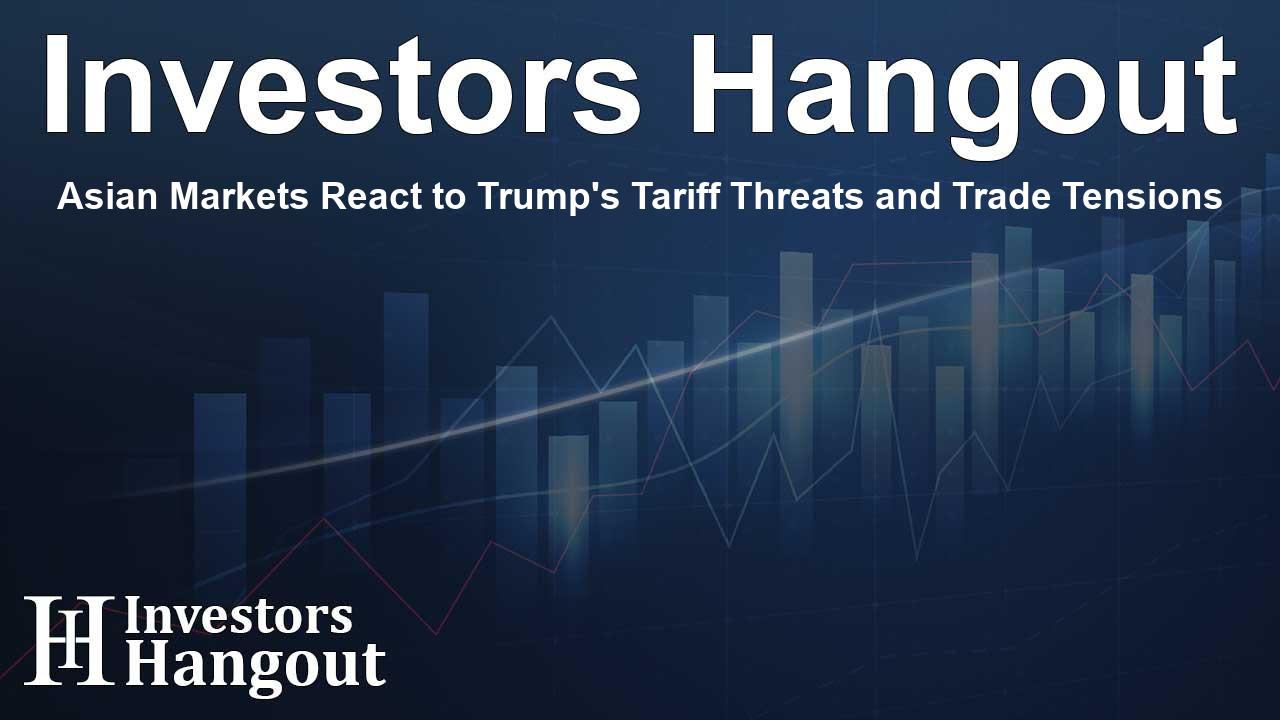Asian Markets React to Trump's Tariff Threats and Trade Tensions

Asian Markets Respond to Trade Threats
On a Tuesday marked by uncertainty, most Asian stock markets faced declines, following alarming statements from U.S. President-elect Donald Trump regarding potential trade tariffs. The proposed measures have reignited concerns about a possible trade war, having a ripple effect across the entire region.
Trump took to his Truth Social network to announce plans for a 10% additional tariff on goods imported from China and a staggering 25% on products from both Mexico and Canada. He justified these tariffs as necessary to combat illegal migration and drug trafficking across U.S. borders.
Prior trading sessions showcased a more optimistic market sentiment when Trump's appointment of esteemed investor Scott Bessent as Treasury Secretary was announced. Bessent's reputation for moderate views on trade led to speculation that he might advocate for more Wall Street-friendly policies within the administration.
On the last trading day before the recent downturn, Wall Street reached impressive record highs. However, Asian futures markets displayed a more muted reaction due to Trump’s aggressive tariff threats.
Market Performance Across Asia
Leading the declines, Japan's Nikkei 225 index fell by 1.2%, accompanied by a 1.3% drop in the TOPIX index. Notably, both indexes had appreciated by over 1% during the prior session, showcasing the dramatic shift in market sentiment.
South Korea's KOSPI also experienced a 0.6% decline, while Thailand's SET Index slightly decreased by 0.2%. Meanwhile, investors in India appeared to be bracing for potential setbacks as futures indicated an underwhelming start for the Nifty 50 index, amidst ongoing controversies surrounding the Adani Group, following serious accusations against prominent executives.
Australia's S&P/ASX 200 index saw a 0.4% drop after an outstanding performance that pushed the index to an all-time high in the previous trading session.
Chinese Stocks Show Resilience
Despite the looming threats of tariffs, Chinese stocks managed to show positive movement. The Shanghai Shenzhen CSI 300 and the Shanghai Composite indexes experienced gains of 0.3% and 0.4% respectively. Hong Kong’s Hang Seng index also achieved a 0.6% increase.
While the potential for increased tariffs poses challenges to China’s economy, experts believe that government fiscal stimulus may alleviate some of the negative impacts. Anticipation surrounds upcoming critical political meetings in December, where new fiscal strategies may be unveiled to counteract tariff effects.
UBS analysts expressed confidence that China's fiscal strategies could significantly buffer the impact of tariffs, and they speculated that retaliatory measures against the U.S. could follow shortly thereafter.
The possibility of a renewed trade conflict between China and the U.S. raises concerns about disruptions in global commerce, which could threaten China's stronghold as a leading exporter while also affecting neighboring Asian markets.
Upcoming Economic Signals
Looking ahead, South Korea's Bank of Korea is scheduled to unveil interest rate decisions soon. Additionally, Japan is anticipating the release of inflation data from Tokyo on Friday, which could provide valuable insight into the region's economic health.
India is set to share its third-quarter GDP report, while China will announce its purchasing managers index data shortly afterwards. There is also a significant focus on industrial profit data from China scheduled for release mid-week.
In the U.S., attention is on the personal consumption expenditures (PCE) price index, a key measure of inflation favored by the Federal Reserve, which will be revealed mid-week and may significantly impact market expectations.
Frequently Asked Questions
What prompted the declines in Asian stocks?
The declines were primarily prompted by President-elect Trump's threats to impose additional tariffs on several countries, raising fears of a renewed trade war.
How did Japanese markets perform in response to the tariff threats?
Japan's Nikkei 225 fell by 1.2%, and the TOPIX index saw a 1.3% drop following Trump's announcement of potential tariffs.
What impact will tariffs have on Chinese stocks?
Despite tariff threats, Chinese stocks showed resilience, with major indexes experiencing gains, likely supported by anticipated government stimulus measures to mitigate the effects.
When will key economic indicators be released?
Important economic indicators, including Japan's inflation data and India's GDP report, will be released later this week, providing insights into economic performance.
What are analysts predicting for the Chinese economy amid these tensions?
Analysts predict that China's fiscal measures may soften the impact of tariffs, but ongoing trade tensions could still pose risks to its economic stability and global trade relations.
About Investors Hangout
Investors Hangout is a leading online stock forum for financial discussion and learning, offering a wide range of free tools and resources. It draws in traders of all levels, who exchange market knowledge, investigate trading tactics, and keep an eye on industry developments in real time. Featuring financial articles, stock message boards, quotes, charts, company profiles, and live news updates. Through cooperative learning and a wealth of informational resources, it helps users from novices creating their first portfolios to experts honing their techniques. Join Investors Hangout today: https://investorshangout.com/
Disclaimer: The content of this article is solely for general informational purposes only; it does not represent legal, financial, or investment advice. Investors Hangout does not offer financial advice; the author is not a licensed financial advisor. Consult a qualified advisor before making any financial or investment decisions based on this article. The author's interpretation of publicly available data shapes the opinions presented here; as a result, they should not be taken as advice to purchase, sell, or hold any securities mentioned or any other investments. The author does not guarantee the accuracy, completeness, or timeliness of any material, providing it "as is." Information and market conditions may change; past performance is not indicative of future outcomes. If any of the material offered here is inaccurate, please contact us for corrections.